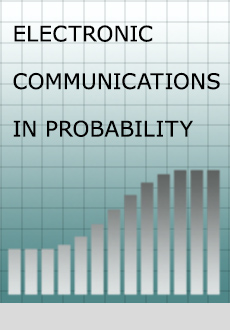Abstract
For the standard elephant random walk, Laulin (2022) studied the case when the increment of the random walk is not uniformly distributed over the past history instead has a power law distribution. We study such a problem for the unidirectional elephant random walk introduced by Harbola, Kumar and Lindenberg (2014). Depending on the memory parameter p and the power law exponent β, we obtain three distinct phases in one such phase the elephant travels only a finite distance almost surely, in the other phase there is a positive probability that the elephant travels an infinite distance and in the third phase the elephant travels an infinite distance with probability 1. For the critical case of the transition from the first phase to the second phase, the proof of our result requires coupling with a multi-type branching process.
Funding Statement
M.T. is partially supported by JSPS KAKENHI Grant Numbers JP19H01793, JP19K03514 and JP22K03333. H.T. is partially supported by JSPS KAKENHI Grant Number JP19K03514, JP21H04432 and JP23H01077.
Acknowledgments
The authors thank the referees for their comments. R.R. thanks Keio University for its hospitality during multiple visits. M.T. and H.T. thank the Indian Statistical Institute for its hospitality.
Citation
Rahul Roy. Masato Takei. Hideki Tanemura. "Phase transitions for a unidirectional elephant random walk with a power law memory." Electron. Commun. Probab. 29 1 - 12, 2024. https://doi.org/10.1214/24-ECP647
Information






